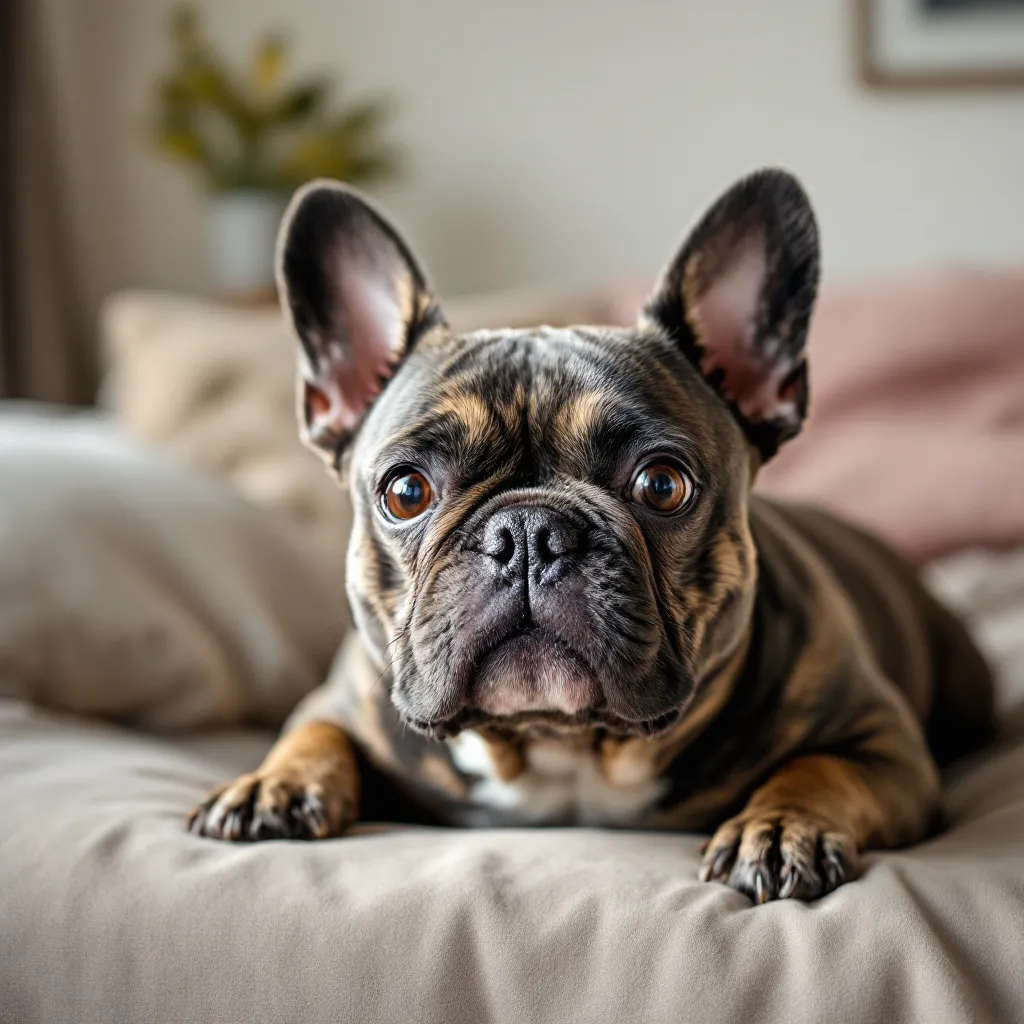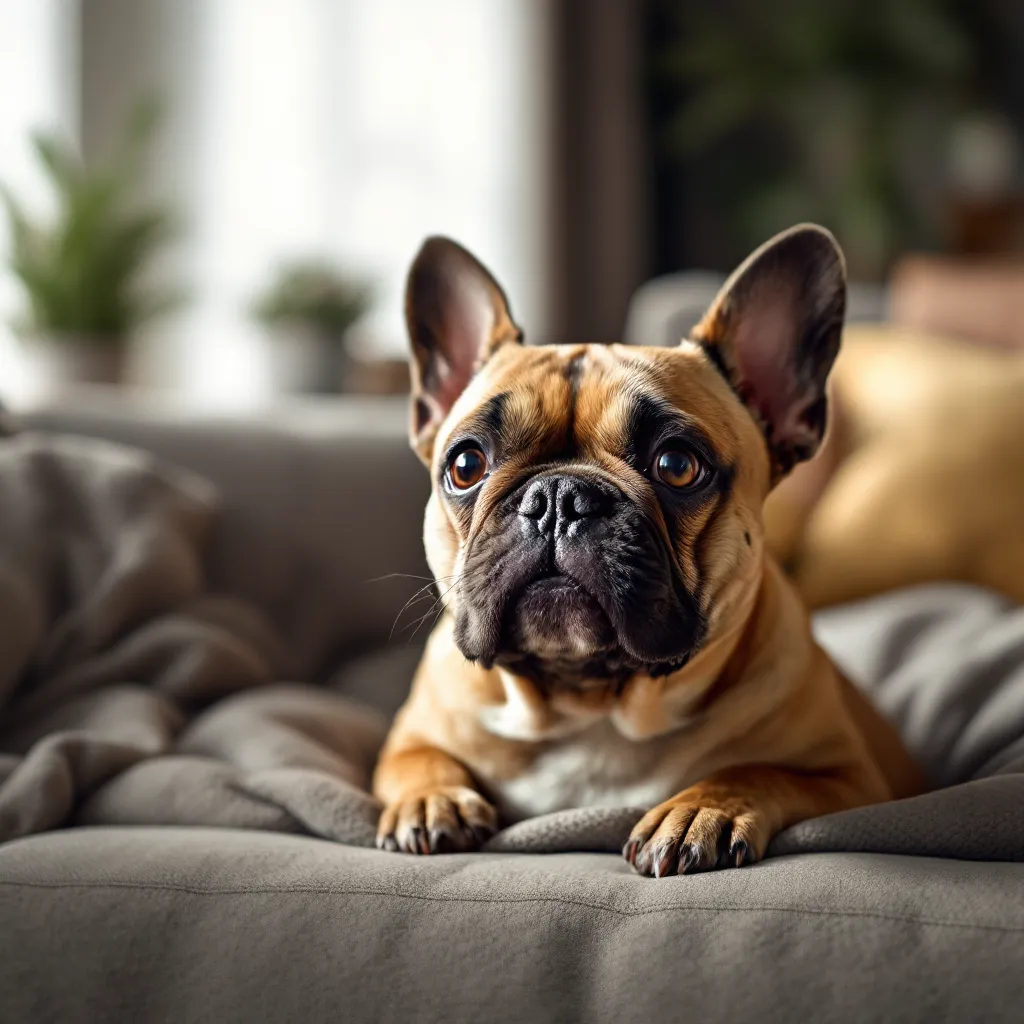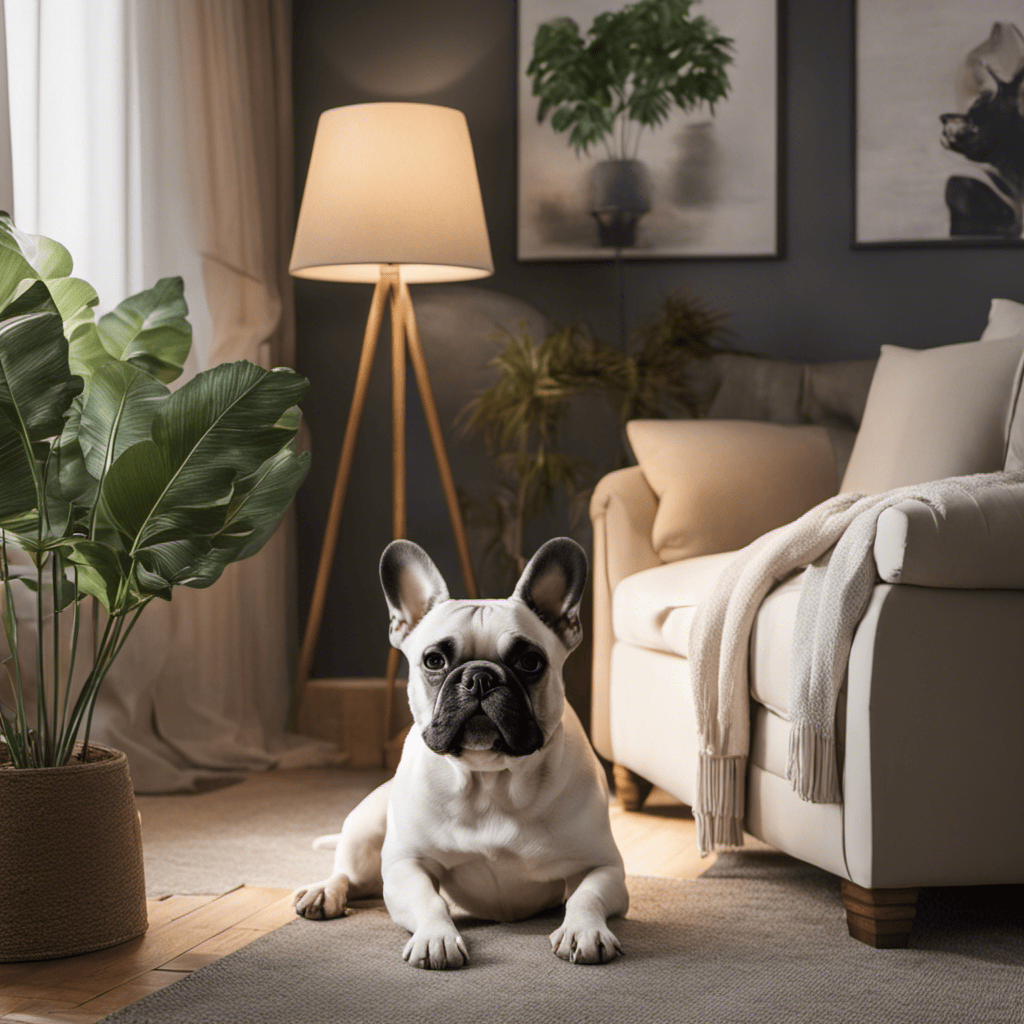Hey! I’m Alex from FrenchyFab.com. I know how tough it is when your French Bulldog is anxious. This guide will help you understand and address their anxiety issues, offering personalized strategies for your 4-legged companion.
Key Takeaways
- Frenchies get anxious: Like people, Frenchies experience anxiety, often from being alone (separation anxiety), loud noises, or new places (unfamiliar environment).
- Know the signs: Look for shaking, excessive barking, destructive chewing behavior and what it means for your Frenchie, pacing, hiding, and changes in appetite, like weight loss. Pet parents should recognize these common symptoms.
- Understand why: Separation, noises, new environments, daily routines changes, past trauma, and genetics can all play a role. There can be additional reasons for anxiety in bulldogs.
- Be their hero: Create a safe space, provide adequate exercise and mental stimulation, and use positive reinforcement (reward-based training).
- Natural help: Anxiety products like CBD oil and calming treats can offer relief, working as anxiety wraps or calming products. Consider alternative methods too.
- Genes matter: Some Frenchies are genetically predisposed to anxiety but can still thrive with proper socialization.
What is French Bulldog Anxiety?
French Bulldogs, a social breed, bond strongly with their owners Anxiety in dogs is a common issue that affects many breeds, and Frenchies are no exception. Separation or feeling unsafe can trigger anxiety attacks or acute anxiety symptoms, leading to behavioral and physical symptoms, impacting their overall quality of life.
Spotting the Signs of an Anxious Frenchie

My Frenchie, Champ, showed me how anxiety can manifest. He became destructive when left alone, exhibiting the worst separation anxiety I’ve seen in French Bulldogs. We worked through it together, improving our harmonious relationship!
Understanding these anxiety triggers in French Bulldogs is crucial for effective treatment. Common signs include:
Behavioral Signs:
- Pacing: Restlessness, especially when you prepare to leave, is a common sign of anxiety.
- Destruction: Destructive behavior like chewing on furniture or digging.
- Whining/Barking: Excessive barking or vocalization, particularly when alone.
- Nervous Licking: Licking themselves or household items obsessively.
- Escape Attempts: Trying to get out of their crate or the house, showing worst separation anxiety.
Physical Signs:
- Upset Stomach: Diarrhea, vomiting, or loss of appetite (weight loss).
- Shaking: Trembling even when it’s not cold, indicating intense stress.
- Panting: Heavy breathing without exertion (dogs pant for various reasons, including stress). Body temperature can fluctuate with anxiety.
Subtle Signs:
- Hiding: Seeking out secluded spots or acting like an anxious puppy.
- Routine Changes: Shifts in eating, sleeping, or bathroom habits (uncontrolled urination).
Table 1: Recognizing Anxiety Symptoms in French Bulldogs
| Behavioral Symptoms | Physical Symptoms | Subtle Signs |
| Excessive Barking/Howling | Trembling/Shivering/ Body shaking | Hiding/Withdrawal |
| Destructive chewing | Excessive Panting | Changes in Appetite |
| Pacing/Restlessness | Diarrhea/Vomiting | Increased Sleep |
| Uncontrolled urination / Defecation | Excessive Licking/Grooming | Loss of Interest in Activities |
| Attempts to Escape/ worst separation anxiety | Weight loss | Changes in Bathroom Habits |
| Aggressive behaviors | Increased Heart Rate | Yawning/Lip Licking (when not tired) |
| Following Owner Excessively/ level of separation anxiety | Dilated Pupils | Avoiding Eye Contact |
| Boredom-induced barking | Drooling | Tail Tucked Between Legs |
| Chewing on furniture | Loss of Bladder/Bowel Control | Flattened Ears |
| Aggression towards people | Shedding (more than usual) | Vocalizations (whimpering, growling) |
Why is My Frenchie Anxious?

- Separation Anxiety: Very common in this companion breed (symptoms of separation anxiety). They can experience anxiety from boredom as well.
- Loud Noises: Fireworks, storms, etc., can be scary, triggering anxiety triggers.
- New Environments: Vet visits, new homes, etc., can be stressful (unfamiliar environment). Variety of people can also be a trigger for some.
- Routine Changes: Frenchies like predictability in their daily routines.
- Past Trauma: Especially in rescue dogs, leading to higher anxiety levels.
- Genetics: Some are predisposed to anxiety (testing for breed traits might be helpful).
- Lack of Mental Exercise: This can lead to anxiety as well.
- Lack of Physical Exercise The energy dogs may become anxious without it.
Table 2: Common Causes of Anxiety in French Bulldogs
| Cause | Description | Examples |
| Separation Anxiety | Distress when left alone or separated from owner. (extended periods of absence can worsen this) | Barking, destructive behavior, pacing when owner leaves. |
| Noise Phobia | Fear of loud noises. | Fireworks, thunderstorms, construction sounds, background noise. |
| New Environments | Anxiety triggered by unfamiliar places or situations. | Moving to a new home, vet visits, new dog park. |
| Changes in Routine | Disruption of daily schedule or environment. | New baby in the home, change in work schedule, rearranging furniture. |
| Past Trauma | Previous negative experiences leading to anxiety. | Abuse, neglect, abandonment (common in rescue dogs). |
| Genetic Predisposition | Inherited tendency towards anxiety. | Certain brachycephalic breeds may be more prone to anxiety. (common health disorders) |
| Lack of Socialization | Insufficient exposure to various people, animals, and environments during puppyhood. (additional socialization can help) | Fear of strangers, other dogs, or new situations. |
| Medical Conditions | Underlying health conditions causing pain, discomfort, or hormonal imbalances. (health issues) | Thyroid issues, cognitive dysfunction, sensory decline. |
| Behavioral issue | Underlying behavioral problems not directly related to a specific trigger. | Generalized anxiety, obsessive-compulsive disorder. |
| Lack of Mental Exercise | Insufficient mental stimulation leading to boredom and anxiety. | Lack of interactive toys, puzzles, or training sessions. |
| Lack of Physical Exercise | Inadequate physical activity resulting in pent-up energy and frustration. (regular exercise is crucial) | Insufficient walks, playtime, or opportunities to run and explore. |
| Inconsistent Daily Routines | Lack of predictability in daily activities such as feeding, walking, and sleeping. | Erratic feeding times, inconsistent walk schedules, disrupted sleep patterns. |
| Unfamiliar Environment | Exposure to new or strange surroundings that the dog finds unsettling. | Traveling to a new place, staying in a kennel, visiting a friend’s home. |
| Obvious Reasons | Clear and direct triggers that can be easily identified as causing anxiety. | A recent move, a new pet in the house, a loud argument. |
| Exposure to Intense Stress | Situations involving high levels of stress or fear. (stressful situations). | Witnessing a traumatic event, experiencing a natural disaster. |
Calming Your Anxious Frenchie

Here’s how to help your Frenchie feel safe and secure, reducing their stress levels:
- Safe Haven: Create a comfy, designated space with familiar items, helping them feel secure even during a period of time when you are away.
- Exercise: Regular exercise like Walks, play, and puzzles are essential for this brachiocephalic breed. (Adequate Exercise)
- Routine: Stick to a consistent schedule (calm routine).
- Positive Training: Reward relaxed behaviors. Use behavior modification techniques and consider behavior training therapy.
- Natural Remedies: Consider anxiety products like CBD oil or calming treats (vet approved), which can act as anxiety wraps.
Table 3: Effective Calming Techniques for Anxious French Bulldogs
| Technique | Description | How It Helps |
| Safe Space Creation | Designate a comfortable, secure area for your dog. | Provides a retreat where the dog feels safe and protected, reducing canine stress. |
| Regular exercise | Engage in physical activities like walks and play. | Reduces pent-up energy and stress, promotes relaxation. |
| Mental Stimulation | Use interactive toys, puzzles, and training sessions. | Keeps the mind occupied, reducing boredom and anxiety. |
| Consistent Routine | Maintain a regular schedule for feeding, walks, and rest. | Provides predictability and stability, reducing anxiety. |
| Positive Reinforcement Training | Reward calm behavior with treats, praise, and affection. | Reinforces positive associations and reduces fear, a great behavior modification strategies for pet parents. |
| Desensitization | Gradually expose the dog to anxiety triggers in a controlled manner. | Helps the dog become accustomed to triggers, reducing fear response. |
| Counter-Conditioning | Pair anxiety triggers with positive experiences (e.g., treats). | Changes the dog’s emotional response to triggers from negative to positive. |
| Calming Music/Sounds | Play soft, soothing music or nature sounds. | Creates a relaxing enriching environment, masking stressful noises. |
| Aromatherapy | Use calming scents like lavender or chamomile (ensure they are dog-safe). | Promotes relaxation and reduces stress. |
| Massage/Gentle Touch | Gently massage your dog or engage in calming touch. | Reduces muscle tension, promotes relaxation, and strengthens the bond of trust. |
| CBD Oil | Use veterinarian-approved CBD products formulated for dogs. | May reduce anxiety and promote calmness. |
| Calming Treats | Give treats containing calming ingredients like chamomile or L-theanine. | Provides a tasty way to help ease anxiety. |
| Pheromone Diffusers | Use diffusers that release calming pheromones. | Mimics natural calming signals, creating a sense of security. |
| Behavior modification techniques | Implement strategies to change unwanted behaviors. | Helps address specific behavioral challenges and improves overall quality of life. |
| Alternative methods | Explore options like acupuncture or herbal remedies. | Offers additional ways to manage anxiety and promote well-being. |
When to Seek Professional Help
Contact a vet or animal behaviorist if:
- Anxiety is severe or worsening (severe anxiety).
- It’s impacting your Frenchie’s quality of life.
- Home methods aren’t helping, and you’re not seeing any training progress.
- You suspect a medical condition or health issue. There may be common health disorders for this animal species.
The FrenchyFab.com Difference
I’ve learned from firsthand experience with my Frenchie, Champ. FrenchyFab.com shares practical tips based on real life, like grooming and managing their unique needs. The average dog owner and even cat parents can learn a thing or two!
FAQs
Are Frenchies prone to anxiety? Yes, due to their sensitive, social nature. Their body language can tell you a lot.
Can it be cured? No “cure,” but it’s manageable with effective methods and management strategies.
How long to see improvement? Weeks, with consistency. You’ll observe behavior over time.
Is medication necessary? Not always; behavioral and natural methods often work, but some health conditions may require it.
Can puppies have separation anxiety? Yes, it’s common in puppies (even a bully puppy).
Most important thing? Patience, understanding, and a loving environment. Spend quality time with your pup!
Conclusion
You can help your anxious Frenchie live a happier life! Understand the signs, causes, and solutions. A calm Frenchie is a happy Frenchie! This will lead to a harmonious living environment.
Hi, I’m Alex! At FrenchyFab.com, I share my expertise and love for French Bulldogs. Dive in for top-notch grooming, nutrition, and health care tips to keep your Frenchie thriving.


